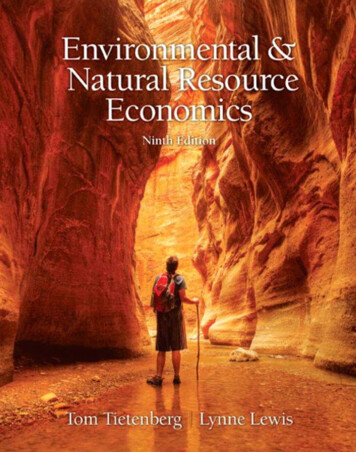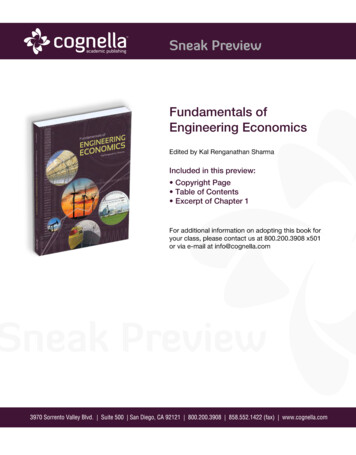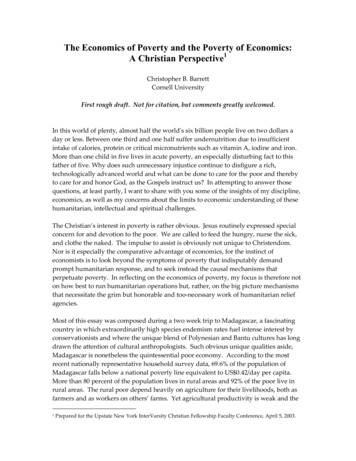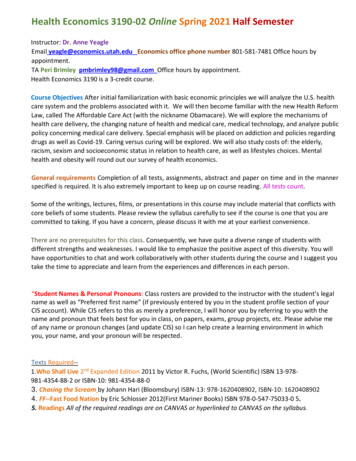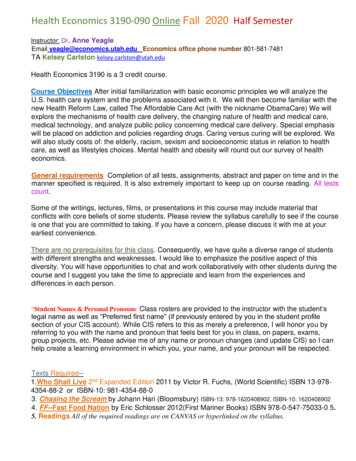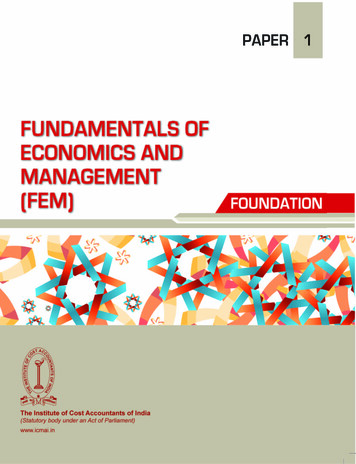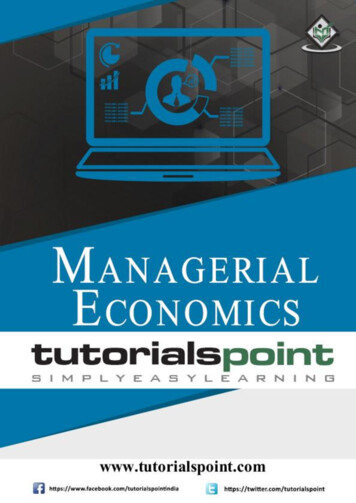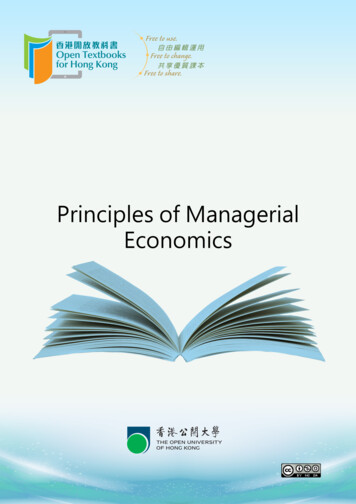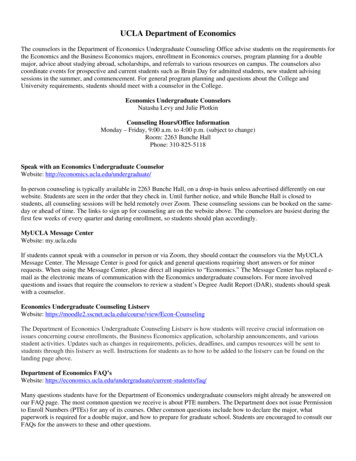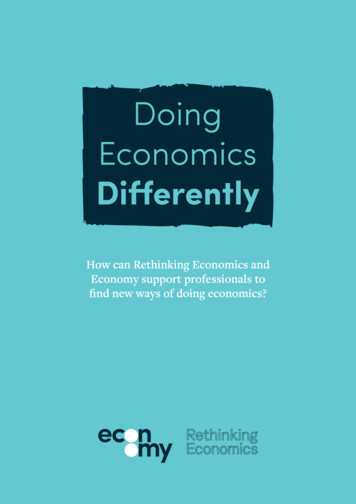
Transcription
DoingEconomicsDifferentlyHow can Rethinking Economics andEconomy support professionals tofind new ways of doing economics?1
ContentsForewordForeword1-2Introduction3-4About the authors4Executive summary5Part 1: The challenges for and criticism of economics todayNew challenges facing economics7-8Criticisms from within the economics discipline8Professional economics in the UK in the 21st century9Our vision for a 21st century economics10The business case10Putting the vision into practice11-13Part 2: What do economics professionals need to do economics differently?Setting the scene: professional economics in the Civil Service, consultancy and financeCommunication – opportunities, barriers and benefitsPluralism – diversifying economic knowledge, analysis and toolsFrom individuals to organisations15-171819-2021Part 3: Case studies for building networks and facilitating reformExploring Economics23Finance Innovation Lab23ICAEW (The Institute of Chartered Accountants of England and Wales)24Exploring Economics24Creating spaces model24Economy Press Working Group model24Part 4: Summary and next steps2The public interest and the business case: unified interests27-28Next steps28-29Appendix 1: Research Methodology30-31Acknowledgements31References32Andy Ross, former Deputy Director and Head ofProfessional Development of the Government EconomicService and now Head of Professional Development ofthe Society of Professional Economists.It is striking that the ideas for improving economics inthis report are a better match with the UK’s QualityCode for Higher Education than is the reality of mosteconomics degrees today.The report, which builds on a range of interviewsand focus groups with people working in finance,government and consultancy, strongly matches theconclusions of workshops from the UK’s GovernmentEconomic Service (GES) and Bank of England that Ihelped coordinate earlier this decade with DianeCoyle and the Economics Network.The conclusions of these workshops, rare exchangesbetween academics, professional practitioners andemployers, were surprisingly consensual: graduates’range of skills and knowledge is too narrow, theuniversity curriculum must better meet the needs ofstudents, employers and the public, and there needsto be a greater emphasis on critical thinking andcommunication skills within economics.These themes are embraced and amplified in thisreport. Where the earlier workshops at the Bankof England bemoaned the barriers to change ineconomics, including busy day jobs and a ResearchExcellence Framework that rewarded the tweaking ofabstract models rather than engagement with messyrealities, this report offers a positive vision for howemployers can improve economics as a discipline,and in doing so, improve their supply of practitioners.Far from suggesting mere tweaks to the status quo,Rethinking Economics (RE) and Economy have revitalisedlegitimate challenges to the overbearing assumptionin universities that the main purpose of economicsis to inculcate the mathematical modelling requiredfor academic economics journals. Since returning toacademia from working in government, I’ve often feltlike shouting “Most economics students do not becomeacademic researchers!” Although mathematicalmodelling is a vital part of economics, and all economistsneed the good data skills so prized by employers,modelling alone does not make a good economist.Focussing exclusively on such techniques leavesthe public and decision makers cold, and turns offpeople who could otherwise become perfectly valideconomists, serving society across a range of careersin the media, think tanks and economist jobs ingovernment. As this report argues, these are commongoals: the world needs more economists, and morepeople who can understand economics.economic events any better than someone who hasnever studied the subject1. It often feels that an attemptto master technique has crowded-out issues wherethere is no definitive ‘solution’, but much need for criticalevaluation and judgement. As this report identifies,such economists are of limited use for the majorityof employers outside of academia.The new generation of economists faces challengesmuch greater than those of my generation. Climatechange will not wait for vested interests to be overcome.Artificial intelligence and biotech may impact the natureof our economic system and societies well beyond thoseof previous technology. Liberal democracies may faceexistential problems like populism, stagnation, domesticinequality, globalisation and the human consequencesof destitution. To cope with these challenges, we willneed the skill that is cited as the most important acrossan extensive survey of Government Economic Serviceeconomists2: ‘Synthesizing Evidence’. This skill requireseconomists to think beyond technical expertise, andto grapple with issues that have no respect fordisciplinary boundaries.“The universitycurriculum must bettermeet the needs of students,employers and the public,and there needs to be a greateremphasis on critical thinking andcommunication skills withineconomics”It’s dispiriting when interviewing candidates for theGovernment Economic Service to see graduates whohave become mediocre mathematicians, unableto transfer their skills to new areas or discuss real1
Brexit has made these challenges evident. There isno definitive answer to the question of whether pastattempts to contain the budget deficit diminishedsocial capital and will thus cause a Brexit wherebudgetary control becomes even harder, or whethersuch measures incited a populist revolt that will makesensible policies more difficult to enact in the future.Such questions have none of the “solutions” typicalof an economics problem set at university. But theyvividly illustrate the damage that a narrow approachcan wreak. Issues like these have led a new generationof economists to question whether their subject, ascurrently practised, is adequately preparing them forthe dramatic transformations and interdependenciesthat characterise the world today.The Government Economic Service and Bank ofEngland originally responded eagerly to Diane Coyle’sprodding because employers had already questionedwhether universities were catering sufficiently to theneeds of economists working outside of academia.Practitioners are judged by their relevance: this meansdirectly engaging with messy realities even when theinsights provided by formal models can’t take themvery far. Likewise, if a practitioner economist cannot beunderstood by the non-economists in an organisation,there is little point in employing them. Messy realitiesrequire a wide range of tools to make progress. Thisreport emphasizes pluralism and communication,and presents findings that accord both with the needsof employers, and with the skills that real-worldeconomists require if they are going to be equippedfor life beyond academic research.The need for pluralism3 is self-evident to practisingeconomists in their day-to-day work, even when, forexposition purposes, such approaches must be playeddown in final reports to stakeholders. Some economistsfear that pluralism equates to ‘anything goes’ or impliesthat economics is all just a matter of opinion. Yet theopposite is true. Pluralism demands critical evaluationin order to select the right tools for the job in hand. Mostof the mistakes in economics that I encounter have notarisen from technical errors, but from failing to appreciatewhether the methods and data used are appropriate.And pluralism has usually been complementary, ratherthan subversive. Likewise, behavioural economics didnot replace neo-classical economics but extended ourrange of interventions. Austrian economics is muchbetter for understanding the wealth creating propertiesof capitalism than neoclassical economics, but it doesnot help much in designing necessary interventions.Agent- based-modelling enables us to see beyondindividual decisions. Feminist economics reminds us ofthe importance of gender in understanding how peopleexperience and participate in the ‘economy’. This list couldgo on. In short, pluralism does not weaken economics: itstrengthens the subject and makes it fit for democracy.“Althoughmathematical modellingis a vital part of economics.modelling alone doesnot make a goodeconomist”I learned about communication through each of thethree Heads of the Government Economic Service.Dave Ramsden showed me the importance of concision.Vicky Pryce demonstrated the importance of beingcompelling. Nick Stern taught me that in order toconvince someone, they must understand what youare saying, so be clear. Too often, economists thinktheir credibility depends on erudition, lengthy caveatsand the use of specialist words and deep referencing.Again, the examples found at university are an excellentmanual for writing in academic journals. Yet theseguides are the opposite of what’s needed when writinga brief for a minister or CEO. Protracted languagediminishes the impact of economics. Making complexitysimple and writing short, not long, takes an enormousamount of practice. But if economists want to impactthe decision makers within an organisation or the widerpublic, they must learn to wear intellect lightly, lest itbecome a barrier that reads ‘trust me, I’m the expert’.This report makes clear the importance of pluralism,communication, and the challenges facing the widereconomics profession. Rethinking Economics andEconomy already have support from multipleindividual economists and employers. In this report,the organisation sets out how they intend to workwith a wider range of employers to produce bettereconomists fit for the real-world workforce and forthe wider public interest. Its vision of professionaleconomics in the 21st century is ambitious.With the support it deserves, it is also achievable.IntroductionTen years ago this month, on 15 September 2008,Lehman Brothers filed for Chapter 11 bankruptcy,triggering a financial crisis that reverberated acrossthe world. Two months later the Queen of the UnitedKingdom asked why nobody had seen it coming. Whilea few economists had cautioned that something wasamiss prior to the crash, many practitioners continuedas if it was business as usual - until it wasn’t.The financial crisis revealed two risks for the economicsprofession. First, that relying on an overly narrow setof tools can obscure truths that go beyond textbookanalyses. In the case of the crash, a deregulatedbanking system and debt-fuelled asset price inflationhastened a domino effect. Yet economists seemedill-equipped to call out the vulnerabilities of thisfinancial system, or foresee its imminent collapse inplaces like Iceland. As US treasury secretary HenryPaulson admitted at the time, “I could have seenthe sub-prime crisis coming earlier”.Second, the crash showed us why communication both within institutions and to the wider public - is key.Economics has become a professionalised subject thatsees itself as distinct from other social sciences4. Thishas led to a reliance on inaccessible prose, with2economists believing their legitimacy is found inerudition rather than simplicity. While the causes ofthe financial crash were multifaceted, many of theproblems underlying it were simple. Yet they werecommunicated in ways that remained inaccessible.One doesn’t need to know the empirics of collateralizeddebt obligations, for example, to understand thatrepackaging various low grade debts into a triplerated chalice is both deceptive and dangerous.The financial crisis revealed a methodologicalmonoculture in economics and a poor track- recordof public communication. These twin issues promptedthe formation of RE and Economy. RE was founded bystudents who wanted to incorporate plural economicapproaches on their university curricula. Having aplural curriculum would ensure students learned abouteconomic history and multiple schools of thought,developing the capacity to translate these into possibleanalytical approaches. But it would also ensure thata range of approaches could be applied to studyingeconomics, moving beyond a paradigm of multiplechoice questions to encourage critical thinking. ForEconomy, the issue was about democratising economicsin the wake of the financial crisis. How could economistsbe encouraged to communicate the economic decisionmaking that affects everyone in society?Together, we have always asked the question: how canwe create change and shift the culture surroundingeconomics? Institutional and sectoral change can3
often feel like an uphill battle. But within the economicsprofession, such change has never been so important.This isn’t just in the interests of the general public, whohave often been left cold by technical jargon. A pluralityof economic approaches and improved communicationis also important for businesses, too, if they wish toanticipate future risks and understand economicrealities. As organisations, Economy and RE want toinstigate this cultural shift in classrooms, businessesand society, reevaluating the role economics playsto make it a practice fit for people and planet.Early on RE identified the importance of workingclosely with professionals to achieve its goals.One of the challenges RE faces is that students havea relatively short time while at university to effectivelypush for curriculum reform. Many committed Rethinkersgraduate into the working world still interested incontributing to RE’s mission, and many find employmentin influential institutions such as the Civil Service,Bank of England, European Central Bank, FinancialTimes, and think tanks and consultancies. RE alumniin the professional world have independently soughtto apply pluralist economics to their work and findnew ways of engaging with the general public. Majordevelopments initiated by RE alumni include forming anetwork in the Civil Service, and establishing Economy.Just as important as these instances are the everydaycases where RE alumni apply different tools andperspectives to their work, or set up discussion groupsand start conversations with friends and family.There has also been considerable interest fromprofessionals who weren’t involved with RE as students.Exploring Economics has found support across the CivilService up to the Board of Chief Economists. Meanwhile,Economy has gained support from organisationsand professionals across finance, consultancyand accounting.Since RE and Economy began to push for greaterpluralism in economics education and instigate bettereconomics communication, we’ve seen an influx ofinterest in these twin issues. The Economic and SocialResearch Council’s Rebuilding Macroeconomics project,a 3.7 million fund that seeks to make macroeconomicsinto a ‘policy relevant social science’, investigates theissue of economic pluralism5. The platform raises keyquestions about the economics discipline and theneed to reform its tools. The Bank of England’s plansto organise Citizen Reference Councils across the UKaddresses a deficit in economics communication byestablishing an infrastructure of schools and adultoutreach programmes6.Like RE, these initiatives were shaped by the shocks ofa financial crisis whose ripples can still be felt today.Organisations, individuals, and institutions such as theBank of England are reforming how they do their workand learning lessons from the truths the crisis broughtto light. For many, 2008 was a wake-up call.But there is still a huge amount to address. Economistsplay a pivotal role in shaping society’s future and thehealth of its governing institutions. In the economicsprofession, prescient individuals and organisationsare striving to address weaknesses, build on strengths,4and improve the practice and culture of the economicsprofession, both among professional economists,and professionals who use economics in their work.These developments convinced RE and Economythat there was a need for formalised, direct supportfor professionals, and for a network where workingprofessionals could come together to collaborate andshare ideas. In January 2018 the Barrow Cadbury Trustkindly agreed to fund research examining how RE andEconomy can work more closely in this field.This report is the result of that process. It explores whatRE and Economy can do to connect and support themany professional economists across the UK who arethinking about and responding to the challenges andopportunities for economics, as well as those interestedin their development in areas like pluralist economicsand public communication.Institutional andsectoral change can oftenfeel like an uphill battle.But within the economicsprofession, such changehas never been soimportantAbout the authorsThis research report is a collaboration betweenRethinking Economics (RE) and Economy. RE, founded in2014, is an international network of students, academicsand professionals campaigning for a better economicsin society and the classroom. In 2015 RE members inthe UK started running an adult evening class, schoolsworkshops and conferences for the public. Later thatyear we received start-up funding to expand that work,and Economy was born.Three years on, Economy is building a movement ofcitizens and economists to make economics into apublic conversation that investigates what mattersand how we can achieve it. Economy provides publiceducation for young people and adults, runs a newsand entertainment platform which finds new waysto talk about the economy, and lobbies the media,politicians and economists to make economicdiscussion more accessible and participatory.Executive summaryThe report is divided into four parts. In Part Onewe explore the opportunities and challengesfacing economics as a discipline and outlinea vision for economics which will underpin ourwork in this area. In Part Two we report theresults of our research with professionals whouse economics, identifying what professionalsin sectors including the Civil Service, financeand consultancy want and need. In Part Threewe explore different models through whichRE and Economy could support networks ofprofessionals. Part Four combines our visionand understanding of the context with thereported priorities and needs of professionals.We also outline our next steps in this area.The conclusion we reach in this report is thatthere is significant appetite for encouraginga greater diversity of economic approachesand for improving the forms that economicscommunication takes within organisationsand to the wider public.3. But these barriers are not insurmountablea. Ethnic, gender and class diversity havegained traction among businesses thatsee how diversity can positively impactan organisation’s culture and output.The argument for economic pluralism andcommunication can learn from this example inorder to build momentum and secure buy-in.4. Building communities from inside is the bestway to secure changea. Following in the footsteps of initiatives likeExploring Economics, we believe the best wayto instigate institutitional change is to supportprofessionals within institutions to launch theirown networks.b. We outline plans for launching a fellowship,providing organisational support, and buildinga community around quarterly social eventsfor professional economists and professionalswho use economics in their work.This conclusion is based on thefollowing findings:5. Other examples for networks to createchange already exist1. The public interest case for a pluralisteconomics and greater communicationof economics aligns with the interests ofbusinessesa. We examine case studies where economicscommunication and pluralism is alreadyhappening, including the GovernmentEconomics Service, the Bank of England,and the Finance Innovation Lab.a. Findings from interviews confirm that ourframework for a public interest economicsaligns with the interests of businesseswho want to communicate economicseffectively to clients, enable economists towork better within their organisations, andencourage a culture of debate, diversity, andinterdisciplinarity across departments.2. There are barriers to enacting institutionalchange within the economics professiona. Professional economists face time pressuresthat can make participating in extracurricularlearning difficult. Not all economists areconvinced by the benefits of pluralism, andsome do not see their roles as public-facing.b. Businesses need to be convinced of thebenefits of pluralism and communication fortheir bottom line in order to secure buy-in.The financial crisisrevealed two risks for theeconomics profession. First,that relying on an overly narrowset of tools can obscure truths thatgo beyond textbook analyses.Second, that communication both within institutions and tothe wider public- is key5
Populist sentiment has sidelined economics asa camp for “experts”, with economists rankingsecond behind politicians as the least trustedprofession7. The financial crash placed thechallenges facing economics as an academicand professional discipline in stark relief,revealing a methodological monoculture that wasunable to spot the warning signs of a financialshock. Yet today economics is needed morethan ever. Disruptions including automation,digital platforms and climate change demandan economic response. In a moment whereeconomics is of acute importance to society, thediscipline registers declining social trust and isperceived as a field for technocratic experts.Part 1The challenges forand criticism ofeconomics todayThere are also healthy criticisms of economicsfrom within the discipline itself, raised byprofessional economists and professionals whouse economics in their work. These includequestions about financial stability and a lack ofdiversity within the workforce.This report will explore how these two types ofchallenges - critiques heard from society at largeand critiques arising from within the professionitself - can be resolved by addressing the lack ofpluralism in economics and instigating bettercommunication of economics subjects bothwithin organisations and to the general public.Inequality is one of the dominant political issues of the 21stcentury to date. Economics as a discipline needs to have acredible analysis of the causes and consequences of differentkinds of inequality (regional, gender, racial, intergenerational,income and wealth) as well as provide a range of policieswhich can be publicly debated in order to rebuild public trustand foster public engagement with economics.The tools economics has at its disposal for analysing inequalityare limited11. Economics often contrasts efficiency andequity, but equity is not as well-defined as efficiency, andis often presented as an afterthought. This makes it harderfor economists to engage seriously with different forms ofinequality and their relative effects. It also presumes that thereis a trade-off between equality and efficiency.Environmental collapseThe threat of environmental collapse represents afundamental challenge to economics. As a complex systemwhose components are not necessarily quantifiable, theenvironment does not lend itself to the relationships that areoften used in economic models. The environment appears insubfields of economics, but the fundamental role that it playsat the heart of the economy, and the dependence of economicactivities upon natural resources, is rarely mentioned. Instead,the environment is framed in mainstream economics assomething that can be priced and traded off against otheroutcomes such as increased GDP12.Economics, and in particular the next generation of practisingeconomists, face the challenge of how best to supportgovernments and businesses to mitigate and respond to theexistential threat of catastrophic environmental damage thatwill undermine the planet’s life support systems.New challengesfacing economicsEconomics has always attempted to have an influence on theworld. In its early years there was a feeling that economicsdidn’t command the respect and power economists felt itdeserved. This anxiety was expressed by the economist IrvingFisher in 1902, when he bemoaned that “economists havealtogether too little influence”8. Now in the early 2000s, thechallenges facing economics are not those of seeking moreinfluence, but being able to fulfil the responsibilities thatcome with power and authority.Financial stabilityEconomics faces the challenge of improving its understandingof the financial system and how it can support governmentsand businesses to promote financial stability, as well asrespond to financial crises when they do occur. Jean-ClaudeTrichet, President of the European Central Bank in 2008stated that “as a policymaker during the crisis, I found theavailable models of limited help.in the face of the crisis, wefelt abandoned by conventional tools”9. This sentiment hasbeen echoed by other central bankers, civil servants andprofessional economists10.6InequalityThe financialcrash placed thechallenges facingeconomics instark relief7
Low levels of public understanding,engagement and trustPolls have consistently found that the general public has avery low understanding of economic terminology. The OECDrecently found that only 38% of the UK public understand whatinflation is13, while 70% didn’t know what Quantitative Easingwas14. This low level of knowledge is caused by and rooted inwidespread alienation from the economics discipline. Yet thepublic recognise that economics is important - even if theydon’t understand it. A recent poll by YouGov found that despite36% of respondents reporting they rarely paid attention toeconomic stories in the media, 83% said they thought it wasrelevant to their everyday lives15.Another feature of the relationship between the British publicand economics is a distinct lack of trust. According to figuresfrom a 2017 YouGov poll, only 25% of the UK population trusteconomists, compared to 71% who trust scientists16. Distrustis contextualised by scepticism about economic institutionsin the UK, epitomised by Michael Gove’s claim during the EUReferendum debate that “people in this country have hadenough of experts”. Research by Positive Money found that66% of Britons don’t trust banks to work in the best interests ofUK society17, and just 11% of the public thinks the UK’s economicsystem helps people from all walks of life to achieve theirgoals. Trust in business fares little better, with 16% respondentsin a poll by Progressive Policy saying they thought big businesshelps people from all walks of life to achieve their goals18.Criticisms fromwithin the economicsdisciplineLack of diversityOne of the growing criticisms of economics in the pastfew years is the lack of diversity in the profession. Amongeconomics A level students in the UK only 28% are women, andonly 1 in 4 academic economists are women19. Of 79 NobelPrize winners in economics there has been only one woman.Only two have been non-white, and shortlists are often allmale20. There is also growing awareness of the lack of socialclass diversity in economics. Students at private school aretwice as likely to study economics at GCSE than students atnon- selective publicly funded schools21. Of the 66 universitiesoffering single undergraduate degrees in economics, businesseconomics or finance economics, 48 were old universities and18 new. Students from less privileged backgrounds are muchmore likely to attend new universities, and as a result, accessto the study of university-level economics at a higher levelhas been restricted22.Lack of economic pluralismEconomics has long been criticised for a narrow set of ideasand tools. In May 1992 an open letter signed by 44 leadingeconomists, including four Nobel Laureates, stated that“economists today enforce a monopoly of method or coreassumptions”. Economists “advocate free competition, but willnot practice it in the marketplace of ideas”, they argued23.8The letter called for “a new spirit of pluralism in economics,involving critical conversation and tolerant communicationbetween different approaches”. A number of books writtenby leading figures in economics and politics critiquing thenarrowness of economic approaches have appeared in recentyears24. Similar criticisms have also arisen from the financesector, among individuals including Willem Buiter, formerchief economist at Citigroup25, and Theo Kocken, founderand co-chief executive of the Cardano Group26.Poor communicationA more recent criticism of economics is its weakness anddisinterest in communicating economic concepts to thegeneral public. Following Britain’s EU referendum vote, duringwhich many economists warned strongly against leaving theEU, Paul Johnson, the director of the Institute for Fiscal Studies,highlighted that economists had “failed to communicatebasic economic concepts to politicians, journalists andbusinesspeople, never mind the public”27.Failures in educating economistsRE has done a considerable amount to highlight shortcomingsin the education of economists. A curriculum review of sevenuniversities in the UK showed that only 7% of exam marksin compulsory modules required critical thinking (up to 22%for all modules) while just under half of all marks consistedof operating a model (see Table 1 below) of which only 3%required students to make links to the real world. Curriculumreviews of undergraduate economics education across theworld show similar results28.More recently, RE released an Employers’ Report illustratingthat employers of economics graduates are also broadlycritical of the economics education29.Professional economics in theUK in the 21st centuryTo be fit for purpose, a 21st century economicsmust be capable of addressing global risks, andmust reflect the diverse society that it seeksto influence. A healthy culture of debate hasbegun to emerge from within and outside of theeconomics profession that demonstrates thegrowing appetite for doing economics differently.Our research highlights ways that the professionalworkplace - economics in the real world - canpositively impact the future of the discipline
find new ways of doing economics? 2 1 Andy Ross, . emphasis on critical thinking and . economics” Foreword Introduction About the authors Executive summary Part 1: The challenges for and criticism of economics today New challenges facing economics Criticisms from within the economics discipline Professi

